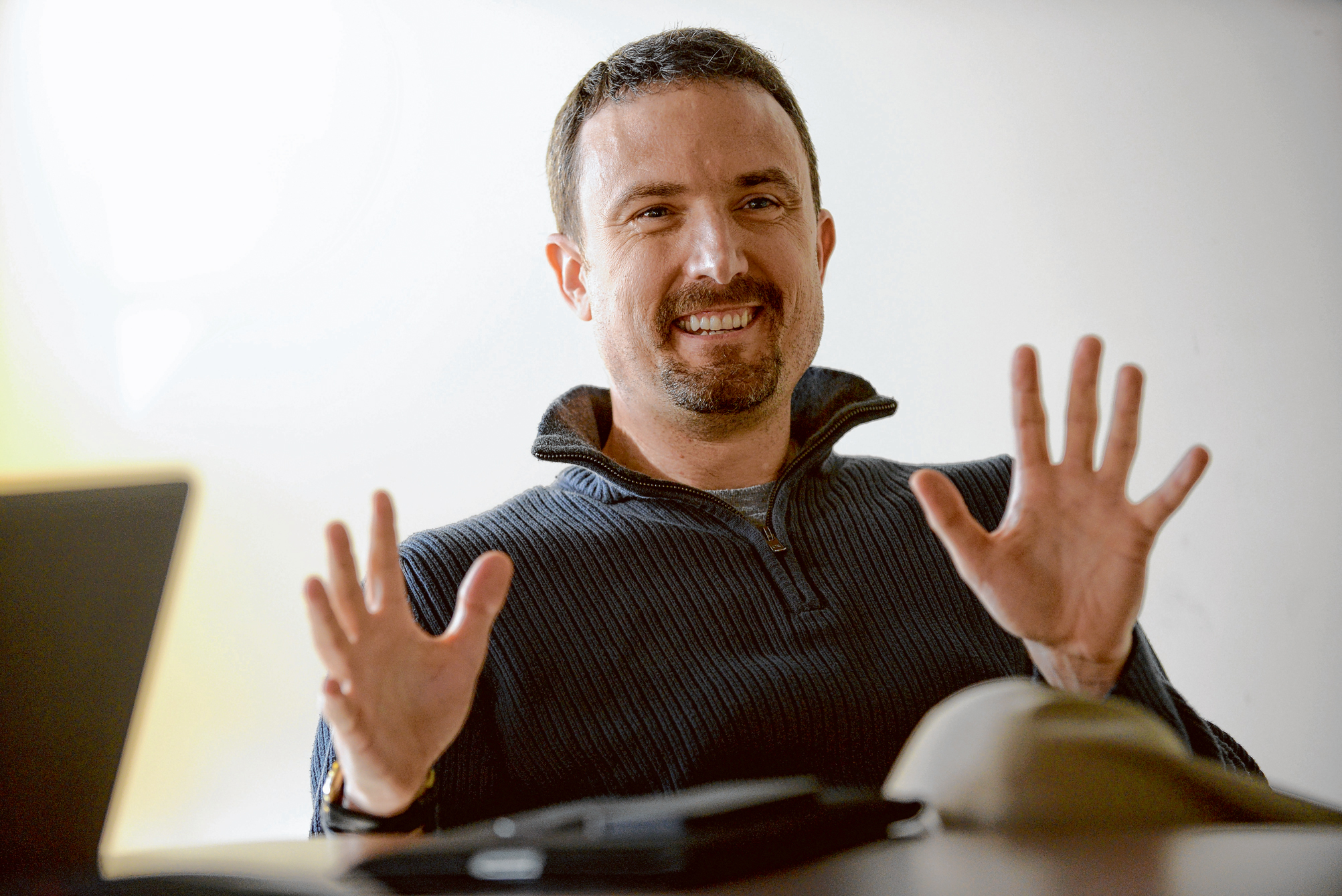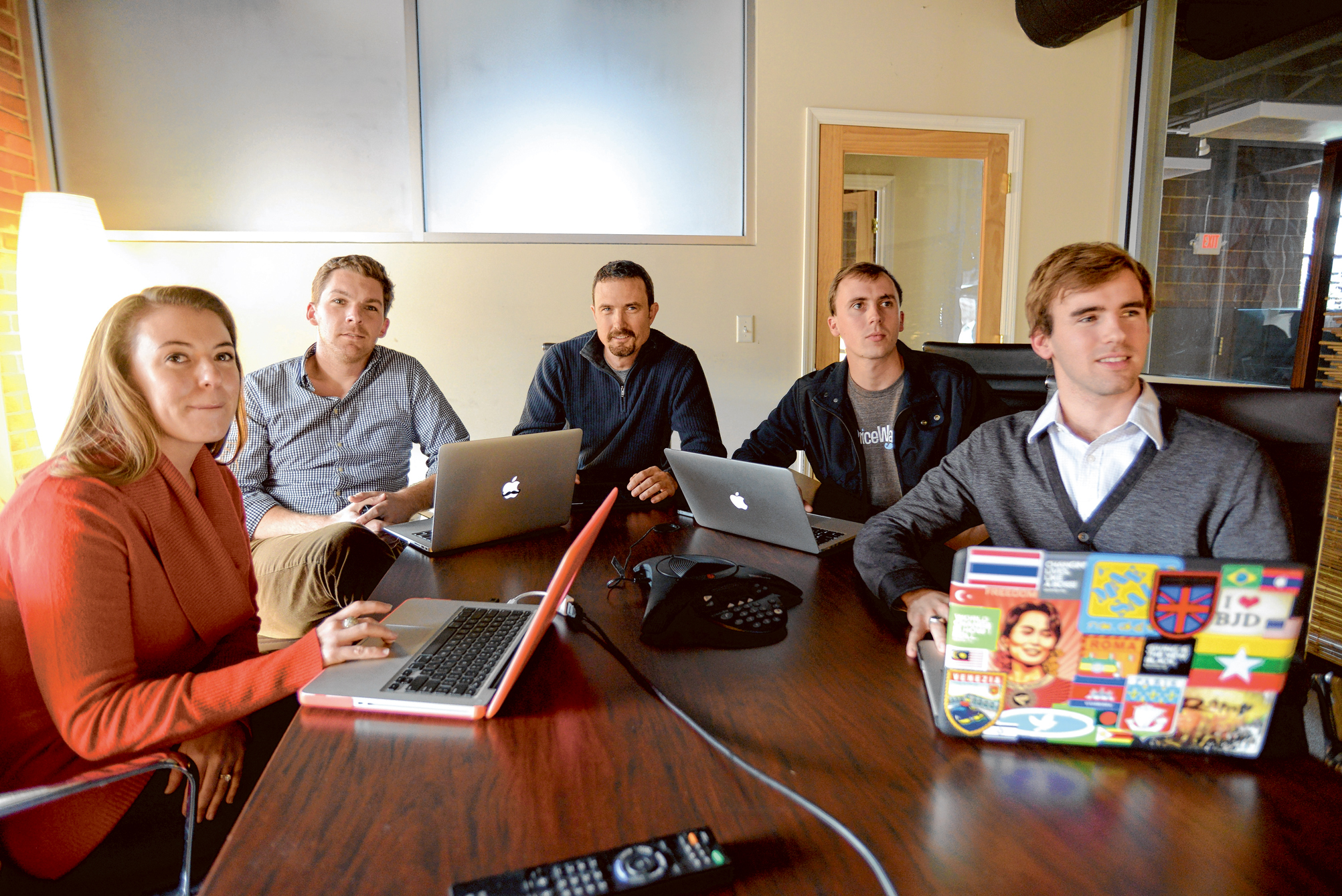You'll find it right there on Stephen Culp's Linked-In profile, just before all the serious stuff. Under "specialties," Culp has written "revenge" and "guessing." Interesting claims for a guy whose latest start-up company, Causeway, is all about compassion, philanthropy and an almost obsessive commitment to planning.
What gives?
Culp laughs when asked about the specialties portion of his profile, a profile that also reveals that he was an NCAA Division I fencer, was named teacher of the year in Hungary while serving in the Peace Corps, worked as an Intelligence Research Specialist for the FBI Olympic Squad in Atlanta where he ran a leg of the 1996 Olympic torch relay, earned a black belt in karate, and has climbed both the Grand Teton and Mt. Kilimanjaro. But that's just the minor stuff.
Read on and you'll discover Culp has also been a lieutenant in the U.S. Naval Reserve, an attorney, a Marshall Fellow, and has served as an adviser for the local Trust for Public Land, CreateHere, Chattanooga 3D, RiverCity Company, the Chamber of Commerce, The Company Lab, Innovate- Here, the American Lung Association, the Theatre Centre and the Ochs Center for Metropolitan Studies. He was a founding partner of the Chattanooga Renaissance
Fund, co-founder of Chattanooga STAND, chairman and co-founder of Smart Furniture, and CEO and cofounder, along with Andrew Scarbrough, of Delegator, a for-profit startup which helps businesses run themselves more efficiently. And now Culp has another start-up venture. In September 2011, along with Scarbrough brothers Stephen and Andrew, Heather Ewalt and Rob Bettis, Culp co-founded Causeway, an all-volunteer-run 501(c) (3) whose mission, simply stated, is to help Chattanoogans help themselves.
Co-founder Heather Ewalt describes Causeway as a "local civic engagement hub," a kind of one-stop online presence that allows anyone with a local civic cause - individuals, companies, nonprofits, Sunday school classes, neighborhood associations - to request local support. And their motto, "Where there's a cause, there's a way," is more than just a catchy slogan. It refers to something the co-founders recognize about compassionate giving, which is that 1) not everyone in the community is able to give financially, and 2) money is not the only way to help. Civic causes often also need manpower, time, tools, materials and ideas.
Enter Causeway, a kind of matchmaker for civic engagement, introducing people with resources, ideas and materials to other people with money, time and tools - the perfect marriage of "cause" to "way."
A perusal of the Causeway website (causeway.org) is the best way to grasp how the concept works.
JUST CAUSEThe five co-founders of Causeway are all full-time employees of Delegator who donate a percentage of their time each week to keeping Causeway running.Causeway itself is a cause. Contributions to Causeway are tax deductible and pay for the website, overhead, credit card fees, etc. Having its own cause allows every bit of the funds donated to other Causeway causes to go to that cause, instead of to the cost of doing business.Beginning in 2012, Causeway announced that it would pass on 110% of donations by providing a 10% match, up to an additional $1,000 per cause.Anyone can start a cause. It must undergo review to ensure it meets IRS guidelines as a charitable cause under their 501(c)(3) public charity status. Once that's done, the cause goes "live."The status of a cause's funding can be tracked on the Causeway website. There's no time limit except that set by the cause itself, where applicable.
There you will find more than 30 active causes and 591 user profiles (these are people who have signed on to offer help, commentary, ideas, or simply to follow what's going on). Four causes have been fully "funded." One of those is "Chambliss Shelter Kids Need More," the first cause ever to be addressed by Causeway. In November 2011, a young woman by the name of Alice Turner recognized that the children housed in the Chambliss shelter over Christmas had no access to gifts. So she started the cause and posted a simple request: $35 to purchase Christmas gifts and clothes for the children, and ten volunteer hours to make it all happen. Almost immediately, members of the Awaken College Lifegroup (including Causeway co-founder Stephen Scarbrough) "adopted" the cause. By Christmas of that year, 55 new clothing items and toys, plus additional funds and 15 volunteer hours, which were used to purchase and deliver the gifts, had been donated. Proof that, as they say on their website, "cause + way + people = results."
Of the 31 causes currently active on the Causeway website, one has personal significance to co-founder Stephen Culp. He is the author of the "CF Smackdown: End Cystic Fibrosis This Decade" cause. "The world goes dark, for a time, when the doctor says your baby girl has been diagnosed with cystic fibrosis," Culp writes. He should know. His 10-month-old daughter was born with it.
While Causeway was founded before she was born, Culp says it has been a perfect venue for raising awareness and funds for CF research. "The cause is coming along well," he reports, "and the Cystic Fibrosis Foundation is considering ways to further increase the 1:1 match offered by a local source, potentially to a 3:1 match." The best part? There are indications that, thanks to continued fundraising efforts, CF will be almost fully treatable within the decade.
But if the co-founders are passionate about Causeway's mission, they are also passionate about Causeway's method. "Causeway is different from a typical nonprofit in that it's based on an entrepreneurial, for-profit model," Culp says. In fact, he calls Causeway a site for growing "civic entrepreneurs." While Kickstarter (the for-profit entity through which projects and businesses solicit funding) describes itself as "standing at the intersection of commerce and patronage," Causeway, says Culp, stands at the intersection of "for-profit principles and non-profit goals."
"We want what the for-profit, start-up world wants: for robust causes to flourish, and less effective, poorly executed ones to die out." This is all part of Causeway's long-range vision, an important component of which is to evaluate the effectiveness of the funded endeavors. "We think of successful ventures like kindling," Culp says. "If it works one place in the community, then obviously we want to capitalize on the idea. We want to use that same concept to get a fire going elsewhere in the community."
Likewise, if a cause doesn't make an impact, then that's valuable information as well. "If you believe in free markets you believe that the better ideas will rise to the top," he adds. This kind of critical, eyes-wide-open evaluation leads to an exploration, a refinement and a re-definition of what works, what doesn't, and why. It is this approach to the non-profit world - organized, transparent, goal-oriented - that makes Causeway's method not just a shot in the dark, but a light in the forest.
Hand-in-hand with looking at Chattanooga from an entrepreneurial, for-profit business perspective is the idea of a bottom-up, as opposed to a top-down, civic economy.
Culp calls on what he learned from both the Peace Corps and Chattanooga STAND, the "world's largest visioning project" in which data was gathered from more than 25,000 people, most of it face to face. "I heard two things over and over," he says. "One was, 'No one's ever asked my opinion before,' and the other was, 'I want to help but I don't know where to start.' In a top-down approach, individuals in a community depend on, for example, government to step in and address the hard issues. In a bottom-up approach, individuals take responsibility for their community in the same way that entrepreneurs take responsibility for their business."
Simply put, if a community understands that it is its own benefactor as well as its own beneficiary, then that community becomes concerned, engaged, motivated and mobilized. It's only through giving up the notion of entitlements that individuals begin to act as guardians of themselves. At that point there is the all-important assumption of ownership. "And when you have ownership," says Culp, "the issues facing that community - crime, education, jobs - start to take care of themselves."
Causeway's greatest challenges? The co-founders smile and exhale collectively.
"Time," says Heather Ewalt, "and getting the word out."
"Educating the community about service and giving," says Culp.
"Convincing people to take ownership," says Stephen Scarbrough. "Getting them to understand that Chattanooga is their city and their responsibility."
"Simplifying the Causeway website so that it's easily accessible, while also making sure it's sophisticated enough to track the data," says Andrew Scarbrough. "That and having an integrative approach to social media that will make it even easier for a cause to rally support." (Can an app be far off?)
"There's a certain point at which success will ramp," Andrew Scarbrough asserts, "Like any start-up business, it just takes time and resources."
As with any great idea, there are wishful imitators, and so it is with Causeway. Culp admits that they are in talks with a nearby city interested in starting a Causeway of its own. It's anyone's guess when that vision might be fully realized. But one thing's for certain: no one is feeling revengeful about it.
Dana Shavin is a local artist whose essays and columns have appeared in Oxford American, The Sun, Alaska Quarterly Review and the Chattanooga Times Free Press. Read and view more of her work at DanaShavin.com and DanaShavinArt.com.


